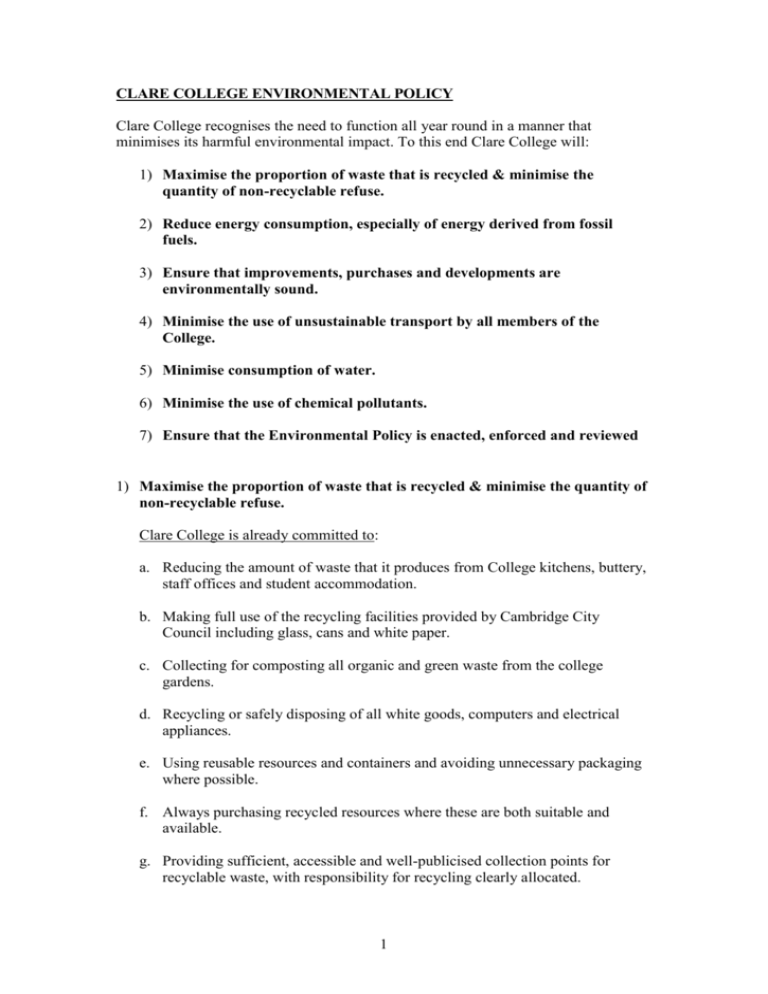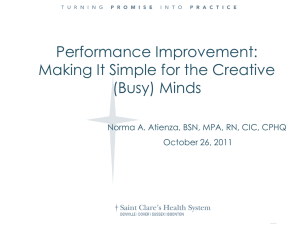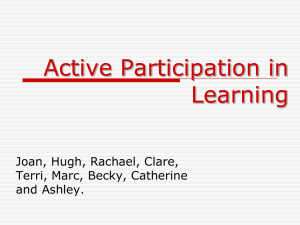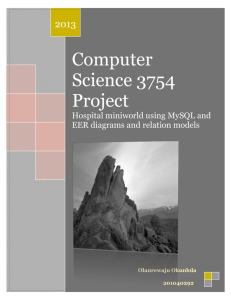Environment Policy
advertisement

CLARE COLLEGE ENVIRONMENTAL POLICY Clare College recognises the need to function all year round in a manner that minimises its harmful environmental impact. To this end Clare College will: 1) Maximise the proportion of waste that is recycled & minimise the quantity of non-recyclable refuse. 2) Reduce energy consumption, especially of energy derived from fossil fuels. 3) Ensure that improvements, purchases and developments are environmentally sound. 4) Minimise the use of unsustainable transport by all members of the College. 5) Minimise consumption of water. 6) Minimise the use of chemical pollutants. 7) Ensure that the Environmental Policy is enacted, enforced and reviewed 1) Maximise the proportion of waste that is recycled & minimise the quantity of non-recyclable refuse. Clare College is already committed to: a. Reducing the amount of waste that it produces from College kitchens, buttery, staff offices and student accommodation. b. Making full use of the recycling facilities provided by Cambridge City Council including glass, cans and white paper. c. Collecting for composting all organic and green waste from the college gardens. d. Recycling or safely disposing of all white goods, computers and electrical appliances. e. Using reusable resources and containers and avoiding unnecessary packaging where possible. f. Always purchasing recycled resources where these are both suitable and available. g. Providing sufficient, accessible and well-publicised collection points for recyclable waste, with responsibility for recycling clearly allocated. 1 h. Making specific arrangements for events, such the May Ball/June Event and ‘Bops’, where significant recyclable waste is likely to be produced, in order to both minimize the waste produced and maximize what is recycled/reused. i. Promoting the reuse of items and waste recycling among staff, students and conference guests through training, posters and incentives. j. Returning print cartridges to the manufacturers and office suppliers for refilling (through the JCR and the Bursar’s Secretary). Clare College will aim to: (over the next 12 months) k. Increase the recycling facilities provided in College by Cambridge City Council to include bins for plastic containers and cardboard. 2) Reduce energy consumption, especially of energy derived from fossil fuels. Clare College is already committed to: a. Providing energy efficient heating systems with adjustable controls for individual heating appliances. b. Encouraging its staff, students and conference guests to save energy through visible reminders and information to increase awareness. This particularly concerns turning off electrical appliances when not in use in both communal and residential rooms. c. Monitoring and understanding the importance of different sources of College energy consumption, and setting appropriate and measurable targets for a reduction in certain areas of consumption and/or in the overall consumption of energy. Clare College will aim to: (over the next 1 - 5 years) d. Give preference to the most energy efficient and environmentally sound appliances available, this includes using energy-saving light bulbs. e. Investigate renewable and carbon-neutral electricity options for the purchase of energy, with the aim of supplying all College properties with electricity that can be attributed to renewable and carbon-neutral sources. (Any increase in the cost of this energy may need to be passed onto the students and so a debate needs to take place with the students to decide whether they are willing to pay extra for renewable and carbon-neutral suppliers.) f. Consider purchasing electricity contracts independent of any consortium in order to obtain a renewable and carbon-neutral supply. Clare College will aim to: (over the next 5 - 10 years) g. Consider on-site micro-generation of renewable electricity. 2 3) Ensure that improvements, purchases and developments are environmentally sound. Clare College is already committed to: a. Seeking and acting upon professional advice in order to minimize the adverse environmental impact of any new developments. This includes efficient heating and water systems, appropriate space for recycling, and the use of recycled and/or sustainable building materials where possible. Clare College will aim to: (over the next 1 – 5 years) b. Purchase efficient and environmentally sound appliances in order to fulfil the commitments in section 2, and consider replacing old stock with ‘greener’, more efficient alternatives. c. Purchase food that has been produced and delivered with minimal impact on the environment, this includes buying locally produced, organic and free-range food. 4) Minimise the use of unsustainable transport by all members of the College. Clare College is already committed to: a. Making available information about bicycle and pedestrian routes and public transport services to staff and students. b. Reducing the proportion of travel on College business carried out in private transport and eliminating unnecessary and inefficient use of College vehicles. Clare College will aim to: (over the next 1 – 5 years) c. Make available information about car share schemes. 5) Minimise consumption of water. Clare College is already committed to: a. Repairing sources of water leakage, such as dripping taps and showers as quickly as possible. b. Purchasing the most efficient washing machines available which have an economy setting as default. c. Reducing water usage in ablution cisterns. Clare College will aim to: (over the next 1 – 5 years) 3 d. Encourage a decrease in water usage among staff, students and conference guests, through visible reminders and information to increase awareness. e. Continue to install appliances that reduce water consumption. 6) Minimise the use of chemical pollutants Clare College is already committed to: a. Making available non-harmful washing up liquid. b. Ensuring that all cleaning products used by College staff have a minimal detrimental impact on the environment, i.e. are biodegradable and non-toxic, even where this exceeds the Control of Substances Hazardous to Health (COSHH) regulations. c. Minimising the use of fertilisers in College grounds, opting for the use of compost produced on site wherever possible. d. Minimising or eliminating the use of pesticides where possible. 7) Ensure that the Environmental Policy is enacted, enforced and reviewed. Clare College is already committed to: a. Ensuring that Clare College has an Environmental Policy that is enforced and reviewed on an annual basis at the appropriate committee. Clare College will aim to: (over the next 12 months) b. Monitor progress and set measurable targets wherever possible. 4










